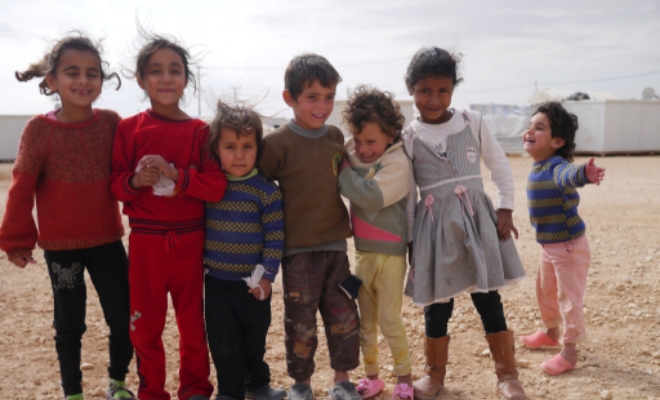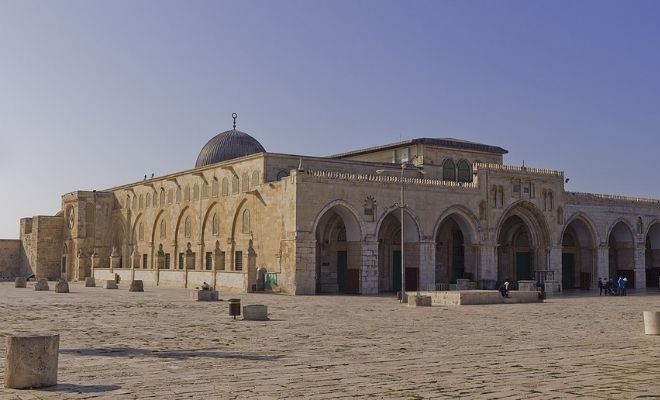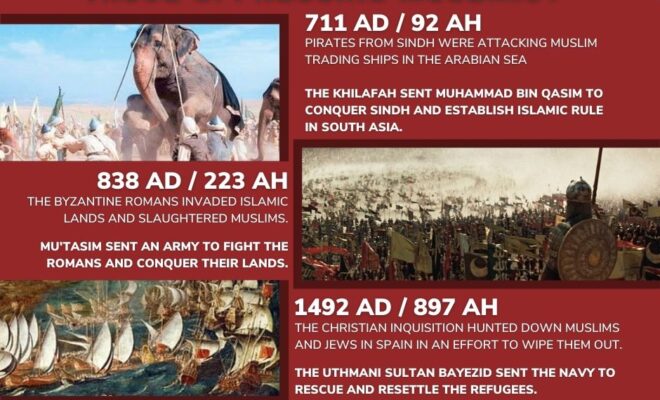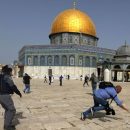Khilafah: The Only Ruling System in Islam
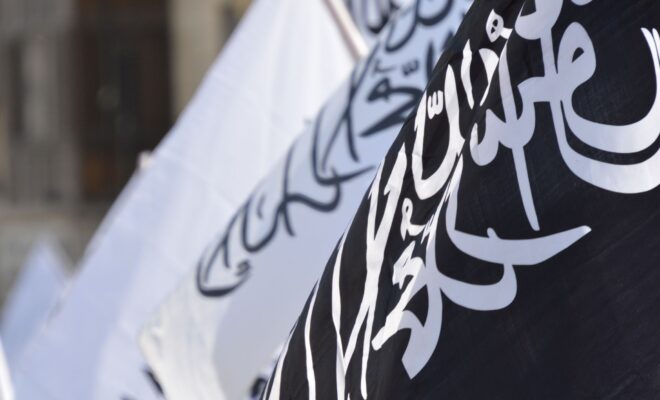
The Capitalist Liberal system, led by the Capitalist elites, brought corruption to every corner of the world after the fall of the Khilafah State. This corruption is obvious when we see the lack of basic necessities like food and shelter, the absence of security and safety, and brutal dictatorships being propped up by the Western powers. In fact, Muslims who reside in the West are well aware of this reality. Under the democratic system, the messaging of the politicians shifts with elections, like the sea tides.
So-called inviolable rights, like those in the “Charter of Rights and Freedoms” can be bent or manipulated due to loopholes such as the “notwithstanding clause” (which empowers provinces to legislate laws that violate the Charter for up to five years). We see this mechanism in effect in places like Quebec, where it is used to ban our Muslim sisters from wearing the Hijab in public-sector jobs, or in Ontario, where it is used to prevent workers from going on strike.
In light of these blatant abuses of power, what is the alternative offered to humanity by the Creator of the universe?
Today, we are seeing a revival amongst Muslims for their love of Islam and interest in learning about how this Deen can solve our personal and collective problems. We have recognized that it is this way of life, given to us by Allah (swt), the All-Wise and the All-Knowing, that is perfect and that its laws and systems are the best ways for humans to live on Earth and prepare for the Day of Judgment.
Allah (swt) says:
“And We have not sent you, [O Muḥammad], except as a mercy to the worlds.” [TMQ 21:107]
The mercy referred to in this ayah includes guidance from Allah (swt) for all aspects of human life. Guidance in our personal lives, family life, community life, and for the Ummah at large.
Capitalism – be it in the form of democracy or dictatorship – is built on one common foundation, i.e., Man-made laws and systems which ultimately seek to fulfil individual human desires, and at any cost regardless of how it harms society. And, in the end, it only benefits the capitalist elite, that shapes policies and laws in their favour, but to the detriment of the people. Today, the results are apparent – unprecedented worldwide poverty, brutal unjust wars, people enslaved in low-wage labour by the corporations, and the destruction of the Earth’s sustainability.
Today’s bleak reality reminds us of an astute and vivid description given by Jafar ibn Abi Talib (ra) when he described to Najashi, King of Habasha, the state of the Arabs prior to Islam. While in his court, Jafar (ra) proclaimed,
“O King, we were a people in a state of ignorance and immorality, worshipping idols and eating the flesh of dead animals, committing all sorts of abomination and shameful deeds. breaking the ties of kinship, treating guests badly and the strong among us ate (exploited) the weak. “We remained in this state until Allah sent us a Prophet, one of our own people whose lineage, truthfulness, trustworthiness and integrity were well-known to us. He called us to worship Allah alone and to renounce the stones and the idols which we and our ancestors used to worship besides Allah.”
Jafar (ra) aptly described the current reality we see as Muslims: The current world order is one in which the “Strong eat (exploit) the weak” and ultimately, we can sense that the world is devoid of a system to show mankind the superior way of living.
This is sadly due to the fall of the Uthmani Khilafah in 1924 and the creation of Nation States across the Muslim lands. These states implement the Capitalist system with a mix of hereditary monarchies that pillage the Ummah’s wealth, implement systems where corruption is the only victor, and autocratic rulers, that use force to break the back of the Ummah.
However, as Muslims and the Ummah of Rasul’Allah (saw), we do have an alternative. Through Islam and its ruling system, the Khilafah, we have the means to liberate all of humanity from the darkness of Kufr and bring them into the light of obeying Allah (swt).
Ruling in Islam
Ruling (al-hukm), reign (al-mulk) and authority (al-sultan) have the same meaning, i.e., the authority that executes the rules, or it is the task of the leadership (al-imarah) which the Shar’a has made an obligation on Muslims to establish.
The ‘task of al-imarah’ is to avert injustice and to settle disputes that may arise. In other words, the ruling means the guardianship, as revealed by Allah
Allah (swt) says:
“Obey Allah and obey the Messenger and those of you in authority.” [TMQ 4:59]
Therefore, to rule is to actively look after the people’s affairs.
Since Islam is an ideology that covers the state, society and life as a whole, the ruling becomes part of it, and the Muslims are commanded to implement this ruling by establishing the state to govern by the Islamic laws. A host of verses have been revealed in the Qur’an confirming the obligation of ruling by what Allah (swt) has revealed.
“So judge between them by that which Allah has revealed and follow not their desires away from the truth that has come to you.” [TMQ 5: 48]
The Shape of the Ruling System of Islam
Islam’s ruling system is unique. It is not based on any man-made ideas, nor does it borrow anything from other systems. In fact, the Islamic ruling system entirely comes from revelation, i.e., from Allah (swt) through the Qur’an and the Sunnah. Every part – be it its laws, institutions, procedures, canons and so on – is from Hukm Shari. Thus, it is wrong to categorize Islam into any of the ruling systems that exists today.
The Islamic Rule is Not Monarchical
Islam is not a monarchy. Monarchies make rule hereditary where the son inherits the authority from his father. But in Islam, the rule is given to whomever the Ummah gives its allegiance or ba’yah.
In addition, monarchies place the king/queen above the law, give them special rights and privileges, and present them as a symbol for the nation. As a result, the monarch can run the country and people as he wishes (as we see this corruption in Saudi Arabia, Jordan, Morocco and other countries). Islam does not allow any of this. Rather, everyone, including the ruler, is accountable to Hukm Shari and is a slave of Allah (swt). And if the Islamic ruler (i.e., Khalifah) openly disobeys Allah (swt), the Ummah can remove him.
It is Not a Democracy
Islam is not a democracy. In democracy, the legislative assembly (parliament, congress, etc) gives sovereignty to the people. Thus, via a majority vote, the people can create or abolish laws as they wish, elect or remove a ruler. In Islam, only Allah (swt) has the right to create laws. The public is not allowed to remove or add to Allah (swt)’s laws.
It is Not a Federal System
Islam is not a federalist system either (where regions can have their own government that is semi-autonomous from a main or central government). In the Khilafah, all regions are combined into one body that answers to one Khalifah. Thus, Marrakesh in the West is the same as Khurasan in the East. The financial affairs of each region are the same, and the funds are spent equally on the needs of all citizens, regardless of where they live in the Khilafah.
In summary, the ruling system in Islam is the Khilafah. The general ijmaa’ (consensus) about the unity of the Khilafah and the state has been established, that it is not allowed to give the Bay’ah to more than one Khalifah. Every imam, faqih (Jurist) and mujtahid (Scholar) has agreed on this. If another Khalifah is given the pledge, while a Khalifah is in office or a Khaleefah had already been given a pledge, the second one should be fought until he himself gives the pledge of allegiance to the first Khalifah or he is killed, for the pledge has been confirmed lawfully to the one who was given Bay’ah first.
Are Multiple Rulers Allowed?
The Prophet (saw) said:
“If the bay`a (pledge of allegiance) is given to two Caliphs, then kill the second of them” [Muslim]
This evidence is explicit in prohibiting the appointment of more than one caliph.
From the consensus of the companions – the words of Abu Bakr (ra) speech upon accepting the pledge of allegiance, he said:
“And it is not permitted for the Muslims to have two Amirs (rulers), since if that would occur, it would lead to a difference in their affairs, and laws, and their unity would be split, and there would be competition between them. That would be leaving the sunnah, and innovation would appear, and fitna would spread, and none of that would be in anyone’s benefit” [Bayhaqi]
Imam ibn Hazm (rh) says:
“And (the jurists) agreed that it is not permitted for the Muslims to have two imams, in the whole world, at the same time – whether it was agreed (to divide the authority) between them or they differed over it. And it is not permitted irrespective of whether they were in the same place, or two difference places.”
Imam al-Mawardi (rh), author of Ahkaam al-Sultaniyyah wrote:
“If two Imams are appointed in separate lands, their leadership is invalid – because it is not permitted for the Muslim ummah to have two Imams at one time (despite the aberrant/ shadh position of those who permitted it).”
Imam Nawawi (rh) states commenting on a hadith where the Prophet (saw) speaks about the Banu Isra’il being governed by their Prophets, while this Ummah will be governed by Khulafa:
“The meaning of this narration is that if a caliph is given a pledge of allegiance after another caliph has already been appointed, then the first appointment is valid and must be fulfilled, whereas the second is void and it is prohibited to fulfil it. It is prohibited for him to request that fulfilment, irrespective of whether they knew of the first caliph or not, and irrespective of whether they were in the same or different locations, or whether one of them was in a land totally separated from the other.”
Islam’s ruling system, the Khilafah, came from Allah (swt). It is unique. It is borne from Revelation. It is clean of all the flaws and corruptions we experience today from secularist systems, like democracy, monarchy, and autocracy. It is the only alternative for humanity, and it is obligatory upon us Muslims to carry it as such. Indeed, as Muslims we cannot remain bystanders rather, we must be active callers to the Islamic ruling system and work for the re-establishment of the Khilafah in the Muslim Lands in order to save mankind from the misguidance of man-made systems.
Let us take Rib’i ibn Amir’s (ra) attitude when he went to Rustom, the Persian general before the battle of Qadisiya as an emissary and was asked for what the Muslims have come to Persia. He responded and said:
“Indeed Allah (swt) has sent us to take people out of the worship/submission of the slavery of other slaves (humans, man-made laws) to the worship/submission of the Lord of the Slaves (Allah) and from the oppression of man-made religions/ideologies to the justice of Islam, and from the narrowness of this world to the vastness of the world and Hereafter.”


